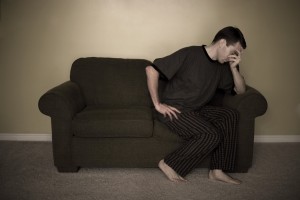 Mental illness is stigmatized. Society looks down on those of us suffering from mental health issues. Sometimes we’re looked at with fear or apprehension; other times with judgement or condescension. As I mentioned in a previous post, a recent survey found that almost half of the respondents believed mental illness to be an “excuse for poor behavior and personal failings.” About 42% said they would no longer socialize with a friend diagnosed with a major mental illness.
Mental illness is stigmatized. Society looks down on those of us suffering from mental health issues. Sometimes we’re looked at with fear or apprehension; other times with judgement or condescension. As I mentioned in a previous post, a recent survey found that almost half of the respondents believed mental illness to be an “excuse for poor behavior and personal failings.” About 42% said they would no longer socialize with a friend diagnosed with a major mental illness.
The human race is certainly not devoid of other types of stigma. We stigmatize people for a variety of reasons, from sexual orientation to religious upbringing. So why is mental health stigma worth talking about?
Well, for one, it affects treatment outcomes. An individual suffering from a mental illness is much less likely to seek help than the same person with a physical illness. With a large lack of social support, that individual will probably find it difficult to adhere to a treatment regime even if they do seek help.
Mental health stigma can also prevent people from getting jobs, securing loans, even having children. Mental illness makes it harder to make friends, keep up relationships, and feel accepted.
I could write an entire article (perhaps an entire book) on the obstacles created by mental health stigma, but today I want to give some tips on how you can help reduce this stigma.
1. Education.
The first step in overcoming any type of intolerance is education. Before we can address a problem, we must first be aware of it. Since mental health education does not come passively, you must seek out this information. To start out, read up on some general psychiatry. The Canadian Mental Health Association is a great place to start. The National Institute of Mental Health is another great starting point. Wherever you’re looking, just make sure it’s accurate, verified, and unbiased information.
You may want to get a little more specific with your research if you have a close friend or family member who was recently diagnosed. If your brother tells you he has major depressive disorder, instead of judging him, read up on the disorder. Hear him out. Learn about how debilitating MDD is. Listen to the symptoms he faces on a regular basis.
We all have preconceived notions of what it means to be “depressed” or “schizophrenic”, but most people actually have a frighteningly incorrect understanding of these illnesses (you can probably attribute most of that miseducation to media portrayals of mental illness…more on that later). Only through re-education can you correct these lapses in judgement.
2. Conversation.
Talk about your mental health more often. The less we hear about a topic, the more easily it can become stigmatized. So open up. You don’t have to spill out your darkest secrets, but you can start small. Everyone has mental health – it only seems to become relevant in our society when that health is compromised. We can change that by changing the way we converse. Everyone feels depressed and anxious sometimes, but we rarely talk about it. If we can get to the point where it’s okay to say “I’m depressed” or “I had a panic attack yesterday”, maybe we can be on our way to eliminating mental health stigma.
3. Language reform.
The last thing – and perhaps the hardest thing – you can do to help eliminate mental health stigma is to change the way you talk about mental health. Mental health vocabulary is often used in a derogatory manner, sometimes unconsciously. Speaking about mental health in this way perpetuates the ideas that cause stigma: that mental illnesses are not real afflictions, that “the mentally ill” should be avoided, and that individuals with mental illness are just weak and whiny.
In order to illustrate my point, I thought I would go through some commonly heard phrases that contribute to stigma and delineate why you shouldn’t say them.
- “Amy gets so moody sometimes – she’s so bipolar”
- “Ben is acting really weird, I think he’s schizo”
In both examples, the speaker is implying that a complex illness like bipolar disorder or schizophrenia is simply “moodiness” or strange behavior. Phrases like these trivialize the experience of the individuals who actually suffer from these illnesses. Also, saying things like this perpetuates the idea that mental illnesses are not real illnesses, and are merely normal experiences exaggerated by “weak” and “lazy” people. Just because someone is moody does not mean they have bipolar disorder.
- “I would rather kill myself than take that exam again”
- “I can’t believe I didn’t get invited to that party – I’m really depressed now”
Suicidal ideation is a common symptom of a range of illnesses, most notably major depression. As someone who has attempted suicide in the past, I find it incredibly insulting when someone implies their day-to-day woes are comparable to the mental state one is in before attempting suicide. Similarly, sadness is not the same thing as depression, and implying so is trivializing the experience of someone who is clinically depressed.
In both of these examples, the speaker (who is not mentally ill) is comparing their daily experiences to the experiences of someone with an illness. I would never say “I have a terrible ache in my side – this pain is worse than cancer” so why should you compare your experience to my illness?
- “Did you see the news story about that psychotic criminal last night?”
In this example, the speaker has labeled a criminal as “psychotic” with (presumably) no real reasoning to do so. The word “psychotic” refers to the state of psychosis, which involves hallucinations, delusions and a general loss of contact with reality. Throwing around labels like “psychotic”, especially in the context of crime, is stigmatizing to those individuals suffering from real psychotic disorders like schizophrenia. Psychosis is a disease state, not some sort of umbrella term to describes criminals and other social deviants.
- “You’re acting crazy – are you off your meds or something?”
People who take anti-depressants or other psychotropic medications (anti-psychotics, benzodiazepines, etc.) are often looked down upon. Taking a medication for depression is no different than taking a medication for the flu, yet society sees things quite differently. Society sees those who take psychiatric medications as “crazy”, “weak”, “lazy”.
Assuming that someone is taking psychiatric medications just because of a particular change in mood or behavior is insulting to both that individual and all the individuals who are actually taking these medications. It perpetuates the stigma of psychiatric medications, which enforces one of the biggest barriers individuals with mental illness face when seeking treatment.
Wrapping things up…
Fighting any sort of intolerance is a difficult battle, and is certainly not won with a single defeat. To fight stigma, we have to change the way we think, feel, and speak about illness. We need to educate ourselves and seek out stories. This isn’t about being politically correct, this is about making people feel comfortable living their lives. It’s not easy, and we all slip up sometimes (I use the term “crazy” sometimes by accident), but if we try, I know we can change the way society sees mental illness.
How do you fight stigma? If you have any ideas I haven’t mentioned, please leave a comment!
 When I started this blog, I had just been diagnosed with panic disorder and agoraphobia, which was my first official diagnosis. That was over three years ago now. I now don’t even meet the criteria for panic disorder – yay me! But what does this really mean? Am I truly recovered? Has my anxiety been expelled from my mind, much like a demon might be exorcised in a horror movie?
When I started this blog, I had just been diagnosed with panic disorder and agoraphobia, which was my first official diagnosis. That was over three years ago now. I now don’t even meet the criteria for panic disorder – yay me! But what does this really mean? Am I truly recovered? Has my anxiety been expelled from my mind, much like a demon might be exorcised in a horror movie?










